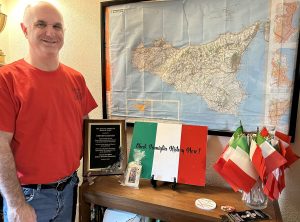Local genealogy “detective” works to solve cases of missing family history
By Lynne Conner for Chronicle Media — November 15, 2023
Steven Salvato stands by a map of Sicily, Italian flags and a plaque he received upon his induction into the Rockford Italian American Hall of Fame. (Photo by Lynne Conner / for Chronicle Media)
Good police work, like genealogy research, is equal parts investigation, dedication and luck.
No one understands that better than Steven Salvato, a genealogy “detective” who has spent the last 24 years helping area residents discover their family roots.
“I love history, which was my major at Iowa State University, and once I graduated and got a laptop computer, I knew I wanted to do genealogy research,” he said. “I have a solid Italian family background and wanted to connect with my heritage.”
So after purchasing some genealogy software, he began researching his family tree and helping others discover their roots.
“Genealogy is detective work because sometimes the best information you find isn’t what you’re looking for,” he said. “In addition to learning about the names and significant dates of your ancestors, you learn about the culture and history of a family’s country of origin.” Salvato, a Winnebago County adult probation officer, provides his genealogy services at no cost to the community. “It’s a never-ending hobby that I learned as I went along.”
Since Rockford has a large Italian-American population, Salvato has been a featured guest at various community events like Festa Italiana and has led genealogy workshops at area museums.
“I mainly focus on Italian and Sicilian family histories and have built up a large database of names, which allows me to print out and forward ancestry information to families,” he said. “If you have basic questions on genealogy, and you’re not Italian or Sicilian, I can help you find websites and provide some genealogy information, but I am a little limited on resources.”
Though Salvato has invested in genealogy software for his research, many free resources are available to search family history.
“Downloading genealogy software allows you to record family names and dates, which is much more convenient than writing everything down on paper. This also allows you to share information with other family members,” he said.
“I only pay for one online genealogy service because there is a lot of free information on the internet and at your local library,” Salvato said. “Some free websites I like are www.familysearch.org, which the Mormons produce; www.findagrave.com, which catalogs cemetery headstones; and newspaper archives at www.infoweb.newsbank.com The Newsbank website can connect you to newspaper articles and obituaries with your library card.”
Through his years of genealogy research, Salvato has uncovered some interesting family stories, including a client suffering from a disease that had no basis in her family medical history. “When we looked into the cause of death for my client’s great-grandmother, it was from the same disease that my client suffered from,” he said.
Salvato notes an unusual Sicilian custom in naming children.
“More than a century ago, the infant death rate was relatively high in Italy and Sicily, so if a child died at birth or shortly after that, the next child born of the same gender would be named after their deceased sibling,” he said. “A client I worked with thought her grandfather was the oldest Dominick of his siblings. With some research, we discovered that there were at least two other boys named Dominick who were born before her grandfather but died as infants. I’ve had other clients who have hit roadblocks in their genealogy efforts because they were searching for the Americanized version of their ancestor’s name rather than the original Italian name.”
Salvato said that having an online or written record of your family’s genealogy is important for several reasons.
“Oral family histories are a good starting point, but use caution because family stories get embellished and changed over time; also, there are certain things families don’t want to discuss. Having factual documentation and written records gives your family tree authenticity and credibility.”
Fostering a connection to your family history, Salvato said, serves to form personal identity and increase cultural awareness.
“Genealogy is a way to honor your family and appreciate the hardships and struggles they endured. Learning about your ancestors connects you to the past and completes the person you are today.”
For more information on genealogy research, contact Salvato at rocamena77@gmail.com







